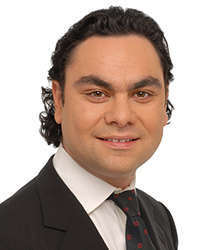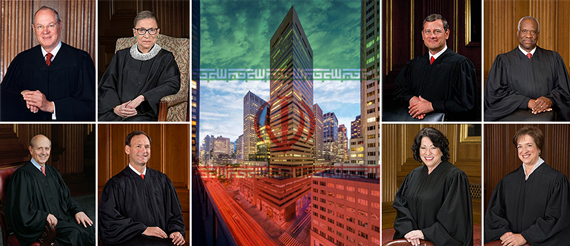When Solmaz Sharif [TRDataCustom], founder of the New York Persian Cultural Center and a broker at LG Fairmont, first moved to the U.S. from Tehran, her Iranian roots didn’t help generate sales.
But after international sanctions on Iran were lifted in 2016 following the U.S.-Iran nuclear deal, she began to see Iranians emerge as buyers of New York City real estate. Per the new regulations, Iranians could buy homes in the U.S. provided they obtained a license certifying that they were not acting on behalf of the Iranian government or any sanctioned companies.

Solmaz Sharif
Around the same time, Sharif’s own mother and her sister secured the paperwork they needed to move here, too. They planned to buy apartments in the Bronx with her help.
All that ground to a halt last week when President Donald Trump’s “temporary” immigration ban went into effect, effectively cutting off immigration from seven Muslim-majority countries — Iran, Iraq, Syria, Somalia, Libya, Sudan and Yemen.
Real estate industry insiders say the ban could have far-reaching consequences for the U.S. real estate market, far beyond simply eliminating investment from the seven named countries. Since the restrictions were announced, buyers from all over the world have put the brakes on buying property in markets across the nation, including in New York, Los Angeles and Miami, numerous industry sources told The Real Deal.
“We’re hearing from customers, not just from those countries but also those on visas from other countries, who are worried that the overall tenor of this administration will make it hard to buy in today’s housing market and are pulling out of their home search,” said Nela Richardson, chief economist for brokerage Redfin. “They just don’t feel comfortable proceeding with a home search when their visa status could be up in the air.”
Investors from the Middle East are some of the biggest players in the New York, Los Angeles and Miami markets. Those investors were estimated to have pushed more than $6.8 billion into New York City’s commercial real estate market between January 2015 and June 2016, according to CBRE. During that period, Middle East investors also spent an estimated $1 billion on commercial real estate in Los Angeles and about $500 million in Miami, the CBRE report notes.
In the first half of 2016, investors from the Middle East pumped an estimated $10 billion into global commercial real estate, according to a report by CBRE. Approximately 90 percent of that investment came from a handful of countries, including Saudi Arabia, Bahrain, Kuwait, the United Arab Emirates, Qatar and Oman, none which are directly affected by the ban.
But the ban could persuade wealthy Saudis — who have reportedly purchased some of the most expensive luxury apartments in the city, including at 432 Park and 220 Central Park South — to hit pause on making further investments. Major sovereign wealth funds, such as Qatar’s QIA, which has significant stakes in the Empire State Building, Manhattan West and a Class-A office property in Los Angeles, could also rethink the wisdom of investing in American markets.

Wassim Fakhereddine
Wassim Fakhereddine, a Corcoran Group agent in Brooklyn, said one of his clients — a landlord with Middle Eastern investors — suspended plans to expand an 11-building multifamily portfolio after Trump announced the travel ban. The client had already purchased a townhouse on 10th Avenue in Park Slope and was in the process of acquiring additional property in New York before the ban hit.
“Once this happened, they said, ‘We’re going to put everything on hold until further notice.’ Investors now feel like they don’t belong here,” said Fakhereddine, a U.S. citizen who was born in Lebanon. “It’s a hairy situation, from a business perspective.”
Meanwhile, Sharif’s mother, who now has a green card, has delayed her move to the U.S., while her sister, a software engineer, has called off her plans entirely. She’s looking into jobs in Canada instead, Sharif said.
“Whatever the Iran deal has achieved, this has undone everything,” she added.
Her clients are also hitting the pause button. One client, a Iranian-Canadian doctor, postponed his search for a home in Astoria, she said. The client and his wife just had a baby and they’re worried they may not be admitted back into the country if they visit family in Canada. Another client, a British man, decided to end his pursuit of multifamily investments in New York.
“He sensed that things were becoming unstable,” Sharif said. “Who can blame him?”
Although most people see the ban as temporary, it does impact the market, according to Michael Nourmand, president of Los Angeles-based Nourmand & Associates.
“People are seeing [flaws] in decision making and in the regular channels of power, and it does show volatility,” he said. “People like the U.S. because it’s predictable.”
The ban, which led to the revocation of tens of thousands of visas, could also hurt real estate business in other ways.

Moiz Malik
Moiz Malik, chief technology officer at Nooklyn, an apartment rental platform, said he may cancel several planned business trips to Colombia and Amsterdam in the wake of the administration’s new policy. Malik, who moved to the U.S. from Pakistan as a small child, said growing up with an Arabic name, he experienced “an intense amount of discrimination.”
“Now I’m thinking, maybe I shouldn’t travel,” he said. “My passport is U.S., but my country of origin says Pakistan. Am I going to face discrimination coming back into the country?”
At one point, investors from Iran and the Middle East looked set to even become bigger players in the international property market. Just last year, it was projected that wealthy Iranians, Iranian companies and state-backed buyers would spend up to $8.5 billion on overseas real estate over the next five-to-10 years, according to a report by London-based brokerage Rokstone.
The Iranian contingent in particular was growing, thanks to rising wealth in the country. An estimated 32,000 Iranians earn over $1 million a year, three times the number in 2000, according to international brokerage Knight Frank. The wealthiest class is also growing: Between 2004 and 2014, the number of Iranians earning $30 million or more skyrocketed 237 percent. That number is expected to jump 76 percent by 2024, according to Knight Frank.
And some of New York City’s biggest real estate investors also have Iranian roots, including developer Joseph Moinian and one of his financial backers, Morad Ghadamian, who made his fortune importing rugs. Ghadamian and Moinian — said to be close friends who are often spotted together at industry parties — have co-sponsored events at the Persian Jewish Center on the Upper East Side.
Iranian companies aren’t strangers to U.S. sanctions as it relates to property investment. In 2013, the U.S. government famously attempted to seize a 36-story office tower at 650 Fifth Avenue, alleging that it was owned by a front for the Iranian government.

Supreme Court justices and 650 Fifth Avenue with the flag of Iran (Credit: 650 Fifth)
Last year, the Second Circuit Court of Appeals overturned the ruling of a District Court that would have allowed the victims of terrorist attacks to be financially compensated from the proceeds of the sale of the skyscraper, by some estimates worth about $1 billion. The appellate court ruled in favor of the Alavi Foundation — a charity established by the shah of Iran in the 1970s with seed money from the government-owned Bank Melli — asserting that the U.S. government hadn’t proved Alavi knowingly acted on behalf of the Iranian government. The Alavi Foundation has petitioned the Supreme Court to hear its case, further clearing the foundation’s name as an agent of the government of Iran and heading off any future attempt to seize the property.
Michael Maduell of the Sovereign Wealth Fund Institute drew a distinction between the banned countries and its richer neighbors. “The countries on the list, like Yemen, Somalia, are not wealthy,” he said. “The ones selected are places where trade will not be as affected, because it is already not being conducted between these nations due to sanctions or bans from the Treasury Department.”
But it’s not just Middle Eastern buyers and investors thinking twice.
Craig Studnicky, a principal at Miami-based marketing firm International Sales Group, said the bigger problem in South Florida is the proposed wall between the U.S. and Mexico.
“It’s hard for us to convince Mexicans to buy property here in Miami; the wall is really upsetting them,” Studnicky said. “That has nothing to do with the travel ban, but a campaign promise that he’s obviously sticking to.”
The ban is one of several immigration-related efforts underway in Washington. Trump is also rumored to be considering major changes to the H-1B program, upping vetting for migrants entering America on high-skilled worker visas.
“The United States has been the leader in the world for 200 years because it’s had a very aggressive immigration policy,” Equity Residential founder Sam Zell said at a conference in Florida earlier this week. “I think that this current period of anti-immigration is very dangerous to the future of our country.”
Cathaleen Chen and Ben St. Clair contributed reporting
